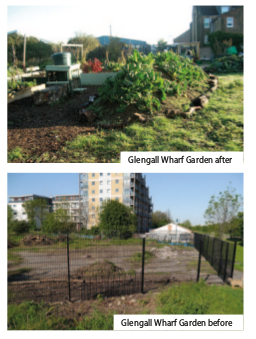“Vision is not seeing things as they are but as they will be”
 Glengall Wharf Garden, London
Glengall Wharf Garden, London
‘Eyesore’ to some, a beautiful, wild place for others, albeit with ‘issues’…
We’re in deepest Peckham at the overgrown site of Glengall Wharf on the defunct Surrey Canal, right next to the biggest park in the borough.
Permaculture seemed the most appropriate response for the transformation of this site; the most beneficial way of metamorphosing 2600m2 of old hard standing, covered in bramble and buddleia into a vibrant and productive community space.
This place once hummed with canal boats offloading timbers from the deal wharves on the Thames. Now, the canal long gone, the wharf is entering a new incarnation as a resource for city people to reconnect with nature, food and growing and become actively involved in the transformation of the wider area.
We wanted to keep the wildness and develop a resource for local people to learn about alternative ways of growing and managing an urban landscape.
We want to change the way people think about how to garden and what they can grow, thinking about the balance between growing food and sharing a space.
Huge hugel mounds encircle the central space, growing abundantly this year with kale and chard.
Old cobbles are exposed and new raised beds, earth mounds, wildflowers and fruit trees are beginning to flourish.
Nothing has been thrown away or cleared from site and except for litter, we’ve managed to reuse or reinvent all debris, rubble and woody material in our gabion walls, woven retaining walls or firewood for the cob oven.
There’s already a change in people too – more confident, more inspired and more familiar with each other!
Creativity seems to be the only appropriate way to work with change or transformation as it implies fluidity and an understanding that once changed, it will grow and change again.
All we are doing is putting in place a framework for future development.
We’ll observe what works, build on our successes, experiment and learn from the mistakes we make and allow the garden a life of its own.
By Sue Amos of Mosspace
www.mossspace.co.uk